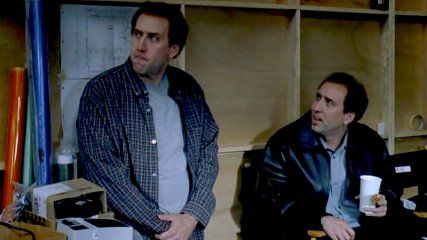Nobody in this town can make up a crazy story like you. You're the king of that.

I've often wondered at what point in the process of adapting Susan Orlean's nonfiction bestseller The Orchid Thief to the screen did Charlie Kaufman decide he needed to invent a fictional twin brother for himself, because surely that is not the sort of thing one does lightly. Similarly, I am about to turn this review over to my 29-year-old self. Here is what I had to say about Adaptation. when I first saw it ten years ago. Only the verb tenses (and a stray word or two) have been changed to protect the incompetent:
Adaptation. Yes, the period is part of the title apparently. This is the sort of film that couldn't have been made if Being John Malkovich hadn't been made first (and, indeed, the making of BJM is a running thread throughout the whole film, with Malkovich, John Cusack and Catherine Keener making cameos.) Nicolas Cage stars as Charlie Kaufman and his twin brother Donald, and not only is it pointless trying to figure out where the real Kaufman ends and the fictional Kaufman picks up, it is beside the point. Kaufman the screenwriter (as opposed to the character of Kaufman the screenwriter) doesn't need a fictional brother to help him bash his loony script into shape. Yes, a certain amount of it is based on The Orchid Thief by New Yorker writer Susan Orlean, but most of the time we're watching Kaufman struggle with how to adapt it and how to adapt to life. Time and place captions and voice overs abound to tell us when and where we are, but after a while it all becomes the same story.
Joining Cage are Meryl Streep as Orlean and Chris Cooper as her toothless subject, flower poacher John Laroche (and her lover in Donald's tarted-up Hollywood ending), with Tilda Swinton as the executive who options Orlean's original story and hires Kaufman to adapt it -- after many others have taken a crack at it and gone down in flames, presumably -- and Brian Cox as short-tempered screenwriting seminar guru Robert McKee, whose hard and fast rules about screenwriting are the bane of Kaufman's existence. (And he gives him a good dressing down when Kaufman states that nothing happens in real life.) Then there's the existence of Donald's preposterous thriller script The Three, which we get a quoted excerpt from at the very end of the film, right before the dedication in his memory. Hey, if you're going to invent a fictional sibling and collaborator, go all the way, dude.
I haven't mentioned director Spike Jonze yet and I should. He's the only director I can think of who would stage two horrific car accidents in such a matter-of-fact way (with the exception of David Cronenberg, but I knew that even before I was halfway through the sentence). And that's just one example of how he uses special effects in the service of the story, not the other way around. Oh, and Carter Burwell's score is excellent (and I caught some echoes of Blood Simple in the later cues). Now, I should wrap this up before I need to invent an imaginary twin to wrap it up for me.
Aww, my 29-year-old self was really cute when we tried to be clever. He also didn't recognize a number of actors that I totally recognize now, like Judy Greer (as the waitress Kaufman unsuccessfully flirts with), Maggie Gyllenhaal (as the makeup girl Donald effortlessly flirts with) and Ron Livingston (as Kaufman's agent, who's bowled over by The Three). And seeing the film for the second time, I'm able to pick up on a lot of things, like the fact that the ending betrays every single principle that Kaufman espouses at the beginning, and the way his voice-over ceases the moment McKee decries them at his seminar. It's just a shame the film lost out on Best Adapted Screenplay at the Academy Awards. I'm not sure how Kaufman would have handled his acceptance speech, but I'm sure it would have been interesting.